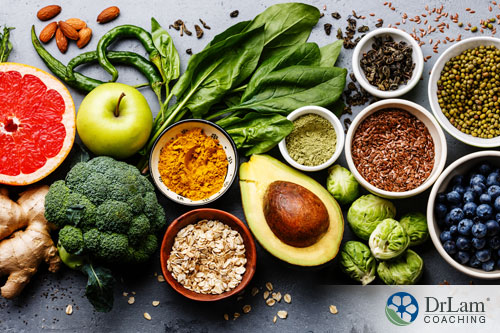 Your diet is an essential part of your health. Not only should you avoid fatty and processed foods that will only damage your overall well-being, you should also ensure you’re getting the right nutrients and vitamins your body needs. This is essential if you want all of the circuits and organs in your body to function properly. A lot of people have been talking about antioxidants lately, and how important they are for your continued health – and for addressing existing health issues. Many foods are rich in antioxidants, and some of them are even more important to add to your diet if you’re suffering from Adrenal Fatigue Syndrome (AFS). Antioxidant-rich foods can support you on your path to recovery and help prevent some of the long-term consequences of Adrenal Fatigue.
Your diet is an essential part of your health. Not only should you avoid fatty and processed foods that will only damage your overall well-being, you should also ensure you’re getting the right nutrients and vitamins your body needs. This is essential if you want all of the circuits and organs in your body to function properly. A lot of people have been talking about antioxidants lately, and how important they are for your continued health – and for addressing existing health issues. Many foods are rich in antioxidants, and some of them are even more important to add to your diet if you’re suffering from Adrenal Fatigue Syndrome (AFS). Antioxidant-rich foods can support you on your path to recovery and help prevent some of the long-term consequences of Adrenal Fatigue.
Antioxidants inhibit oxidation—a process that produces damaging molecules known as free radicals—and remove oxidizing agents from your body. Your body also produces free radicals as a result of exposure to environmental toxins such as pollution, smoke, and industrial chemicals. Most of the time, free radicals are harmless. However, if too many accumulate inside the body, this can lead to oxidative stress which damages the body and may cause the following conditions:
Free radicals and antioxidants should be balanced in the body – antioxidants stabilize free radicals and prevent them from causing harm. So, when there aren’t enough antioxidants, more and more free radicals gradually accumulate.
There a lot of different antioxidants found in food. Some of the most beneficial are:
Lycopene is found in the red pigment of tomatoes, watermelon, and guava. This protective antioxidant that can reduce your risk of heart disease and cancer.
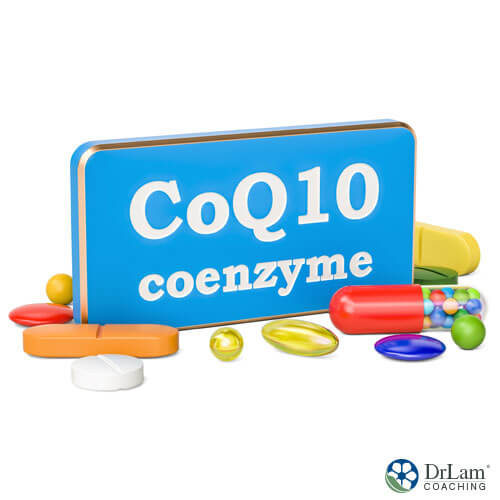 The antioxidant is produced by the body and protects the heart, reduces signs of aging, and supports the immune system. Production of the coenzyme tends to decline with age.
The antioxidant is produced by the body and protects the heart, reduces signs of aging, and supports the immune system. Production of the coenzyme tends to decline with age.
This extremely powerful antioxidant improves the performance of all the other antioxidants in your body. Known as the great recycler, it brings to life other antioxidants that have been used. Your body naturally produces glutathione, but you can also boost its production by eating plenty of whey protein and high-quality dairy and eggs.
This antioxidant is extremely good at scavenging free radicals throughout the body and can also help reduce inflammation and increase insulin sensitivity. Alpha lipoic acid is found in foods like potatoes, broccoli, spinach, and organ meats.
The antioxidant can be found in red wine, grapes, vegetables, and cocoa and provides protection for your brain and nervous system.
Antioxidants are your body’s best defense against the damaging effects of free radicals. Here are some of the general benefits you’ll enjoy when you add more antioxidant-rich foods to your diet:
It’s always best to get antioxidants from the food you eat. Supplements can be useful in certain situations, but they can also react with medications and could exacerbate certain health conditions.
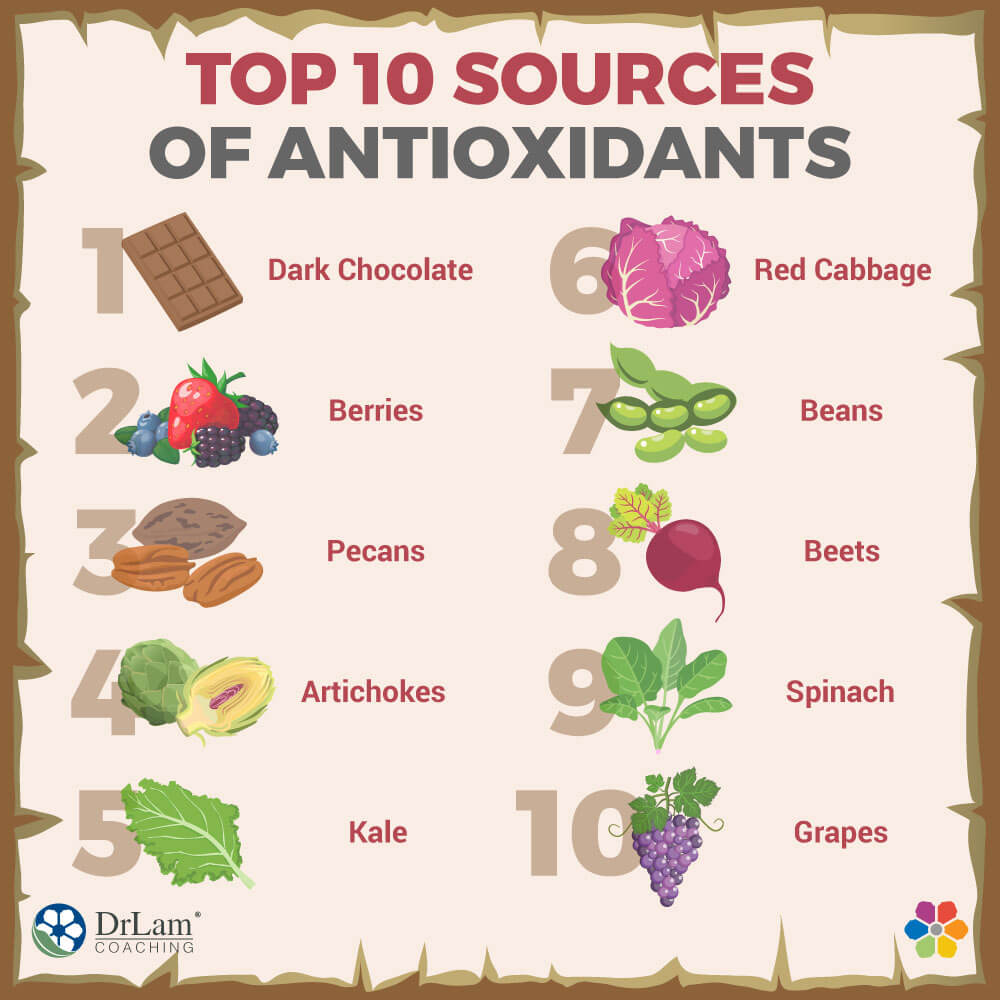
Antioxidants are mostly found in fruits and vegetables. On the other hand, prolonged exposure to processed foods—which lack antioxidants—as well as stress, medications and pollution, can increase the number of free radicals in your body and throw off your natural antioxidant-free-radical balance. If you’re concerned about your own body, here are some of the best foods you can eat to help restore this balance:
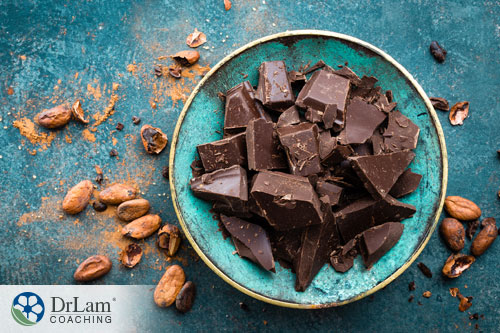 Dark chocolate is incredibly nutritious, containing up to 15 mmol of antioxidants per 100 grams, which is more than berries and other sources. It can also help decrease inflammation levels in the body and reduce your blood pressure, thereby reducing your risk of heart disease. Dark chocolate can increase antioxidant levels in your blood, which can raise “good” cholesterol levels (HDL cholesterol) and lower “bad” cholesterol (LDL cholesterol). The latter can increase inflammation in your blood vessels and therefore, increase your risk of heart disease. However, if you’re suffering from AFS, you’ll need to be careful since the cocoa found in dark chocolate can have stimulating effects.
Dark chocolate is incredibly nutritious, containing up to 15 mmol of antioxidants per 100 grams, which is more than berries and other sources. It can also help decrease inflammation levels in the body and reduce your blood pressure, thereby reducing your risk of heart disease. Dark chocolate can increase antioxidant levels in your blood, which can raise “good” cholesterol levels (HDL cholesterol) and lower “bad” cholesterol (LDL cholesterol). The latter can increase inflammation in your blood vessels and therefore, increase your risk of heart disease. However, if you’re suffering from AFS, you’ll need to be careful since the cocoa found in dark chocolate can have stimulating effects.
Berries of all descriptions contain high levels of antioxidants. For example, blueberries have up to 9.2 mmol of antioxidants per 100 grams and strawberries contain around 5.4 mmol per 100 grams. Goji berries offer 4.3 mmol per 100 grams. That’s why eating berries can help protect your cells and reduce inflammation. Blueberries also contain several vitamins and minerals that are essential for the health and proper functioning of your immune system and phytochemicals that can help protect against cancer.
Pecans have around 10.6 mmol of antioxidants per 100 grams and increase blood antioxidant levels. Studies have shown that eating pecans can decrease LDL cholesterol levels by up to 33 percent, which can lower your risk of heart disease.
Although not very common in the average Western diet, artichokes have high antioxidant levels and also contain many essential minerals and fiber. They boast 4.7 mmol of antioxidants per 100 grams and are especially rich in chlorogenic acid (an antioxidant), which can help reduce inflammation and may lower your risk of cancer, heart disease, and diabetes.
Kale is one of the most nutritious greens on the planet and comes in several different varieties. Red varieties, such as Redbor kale, contain as much as 4.1 mmol of antioxidants per 100 grams whereas other varieties only contain around 2.7 mmol per 100 grams. Kale also contains vitamins A, C, and K.
Red cabbage, also known as purple cabbage, contains high levels of vitamins A, C, and K and 2.2 mmol of antioxidants per 100 grams – more than four times the amount found in regular cabbage. They contain the antioxidant group known as anthocyanins, which reduce inflammation and protect against heart disease.
There are several different types of beans and they are all healthy because they contain lots of fiber and antioxidants. For example, green broad beans contain 2 mmol per 100 grams and pinto beans contain an antioxidant known as kaempferol that can reduce chronic inflammation and inhibit cancer growth.
Beets or beetroot are a good source of fiber, iron, folate and potassium. They also contain 1.7 mmol of antioxidants per 100 grams. Research suggests they contain other compounds that help suppress inflammation. Because beets tend to be quite sweet, it’s important to eat them in moderation.
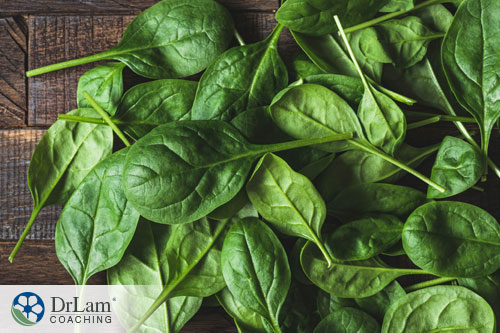 Spinach is one of the best foods you can eat if you’re trying to lose weight. The green flowering plant is incredibly low in calories but amazingly high in vitamins and minerals and also contains 0.9 mmol of antioxidants per 100 grams. Spinach is a good source of zeaxanthin and lutein, two important antioxidants that help protect your eyes from the potential damage caused by light and free radicals.
Spinach is one of the best foods you can eat if you’re trying to lose weight. The green flowering plant is incredibly low in calories but amazingly high in vitamins and minerals and also contains 0.9 mmol of antioxidants per 100 grams. Spinach is a good source of zeaxanthin and lutein, two important antioxidants that help protect your eyes from the potential damage caused by light and free radicals.
Grapes of all colors are loaded with antioxidants that can help protect you from cancer and heart disease and can boost your immune system.
It might seem as though a plant-based diet would lack certain essential vitamins and minerals like iron and protein. However, if you eat a variety of different plants, you can easily get all the nutrients and energy your body needs. You should try to eat many different types of plant protein at throughout the day. The general rule is one legume for every grain. Many people have successfully eaten this way for generations without problems.
One of the most important things that antioxidants do is protect your body against the inevitable aging process. As you age, every organ and system of your body is affected by free radicals. Every time you’re exposed to negative elements—both indoors and outdoors—free radicals are produced. The environment can have a negative influence on molecules inside your cells, turning them into free radicals. If this happens, free radicals can travel around wreaking havoc throughout your entire body. In blood vessels, they can convert the bad cholesterol into the form that blocks arteries. In your eyes, they can damage cells of the retina and cornea, potentially leading to cataracts and blindness. And in your skin, they can damage cellular DNA, thereby increasing your risk of skin cancer and accelerating wrinkle formation. These are just some of the effects of free radicals and the problems they cause. And this become even more of a concern the older you get since the number of free radicals in your body increases with age.
Free radicals are responsible for a lot of the signs of premature aging, and for the problems that come with age. Luckily, you can fight against the effects of time by adding more antioxidant-rich foods to your diet. This can help slow down cell degeneration, promote better heart health, fight inflammation, and improve your vitality – and your overall zest for life.
Since AFS is closely linked to stress, it is also strongly linked to the early signs of aging. Stress hormones and the toxic reactions created in the body during time of stress are well-known causes of free radical generation. So, if you experience stress on a regular basis, you’ll probably experience premature signs of aging, which could become even worse if you suffer from AFS.
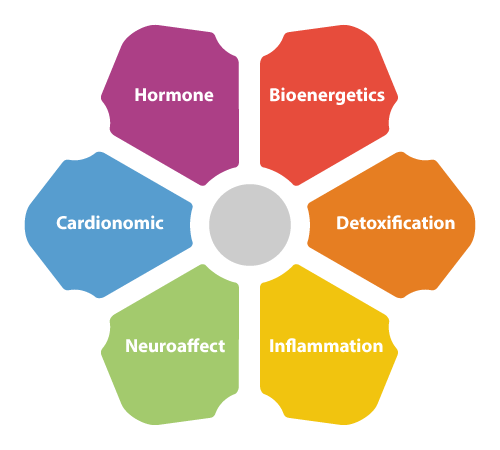 Everyone has different limits when it comes to stress. Some people are exposed to stress for years without noticing any adverse effects. Whereas others experience debilitating stress-induced health problems. This is mainly because of the NeuroEndoMetabolic (NEM) Stress Response, a self-regulating system that protects your body from stress. When you encounter a stressor, the NEM Stress Response send a message to the adrenals glands to start releasing more cortisol—the stress hormone—which helps prepare your body to respond. However, if the NEM stress response remains active for a long period of time due to chronic stress, your adrenals will become overworked and eventually, fatigued. And this can lead to additional problems. Moreover, the release of this cortisol creates free radicals.
Everyone has different limits when it comes to stress. Some people are exposed to stress for years without noticing any adverse effects. Whereas others experience debilitating stress-induced health problems. This is mainly because of the NeuroEndoMetabolic (NEM) Stress Response, a self-regulating system that protects your body from stress. When you encounter a stressor, the NEM Stress Response send a message to the adrenals glands to start releasing more cortisol—the stress hormone—which helps prepare your body to respond. However, if the NEM stress response remains active for a long period of time due to chronic stress, your adrenals will become overworked and eventually, fatigued. And this can lead to additional problems. Moreover, the release of this cortisol creates free radicals.
The NEM stress response is only supposed to be active for short bursts. But this doesn’t fit in well with the demands of modern life. Work problems, relationships woes, environmental toxins, unhealthy diets, and poor lifestyle choices can all contribute to chronic stress. And this situation can bring on AFS.
As you move through the various stages of AFS, you’ll start to experience many changes that are detrimental to your health and your free radical levels. The circuits of your NEM Stress Response will become imbalanced and start to affect the function of almost every organ of your body. As inflammation steadily increases, the detoxification process starts to break down resulting in a build-up of toxins throughout the body as well as compromised digestion. Moreover, the symptoms of AFS will create even more stress and worry and contribute to the build-up of free radicals. So, if you are suffering from AFS, you may have already noticed some of the early signs of aging. This unnatural aging process occurs when the balance between free radicals and antioxidants in your body is disrupted.
Antioxidants are key to cardiovascular health. However, imbalances in the Cardionomic Circuit are quite common in those suffering from Adrenal Fatigue. The Cardionomic circuit—comprised of the adrenal glands, cardiovascular system (CVS), and the autonomic nervous system (ANS)—is usually the first to become activated when you’re exposed to stress. If you’re suffering from AFS, your adrenals are overworked as a result of high demands for the stress hormone cortisol. This can be enough to throw your Cardionomic Circuit into disarray. Unfortunately, since the three components of this circuit are so interconnected, when one becomes unbalanced the others quickly follow. This can cause several seemingly unrelated symptoms such as fatigue, exercise intolerance, insomnia, irregular or rapid heart rate, anxiety, and blood pressure fluctuations.
 Imbalances in the Cardionomic Circuit also have the natural effect of creating even more stress within components of this circuit, and thus free radical production. Free radicals cause premature aging in this extremely vital system of the body. You may think this sounds fairly frightening, and it is. But you can help fight these negative effects and protect your Cardionomic Circuit from the ravages of AFS by getting plenty of antioxidants.
Imbalances in the Cardionomic Circuit also have the natural effect of creating even more stress within components of this circuit, and thus free radical production. Free radicals cause premature aging in this extremely vital system of the body. You may think this sounds fairly frightening, and it is. But you can help fight these negative effects and protect your Cardionomic Circuit from the ravages of AFS by getting plenty of antioxidants.
Cardiovascular health is a major issue, even for healthy people, and is also the biggest killer worldwide. Even in developing countries, cardiovascular disease has become a major problem. In 2012, over 17.5 million deaths were attributed to cardiovascular disease, accounting for 31 percent of global deaths. That’s why it’s so important to take steps to improve and protect your cardiovascular system where and whenever possible.
When you’re suffering from AFS, experiencing the symptoms of Cardionomic Circuit dysfunction can extremely frightening. And while cardiovascular problems are viewed as an almost normal symptom of aging, they can also be a clear sign of premature aging. Fortunately, you can prevent these problems by simply changing your diet.
According to numerous studies, antioxidants are extremely useful in the fight against cardiovascular disease. Free radicals attach to LDL or ‘bad’ cholesterol and can promote the buildup of plaque in arteries around the heart. Plaque slows blood flow and can eventually block the flow of blood completely, leading to heart attack or heart failure. Free radicals can also increase inflammation. Chronic inflammation is a serious problem in the modern world and is also a well-known cause of heart attack and heart disease. Any measures you can take to reduce inflammation will have widespread health benefits. Inflammation is also one of the most serious issues you’ll experience with AFS as it will contributes to toxic overload and can also cause a variety of diseases and other health-related problems.
One of the ways antioxidants improve the symptoms of AFS is by reducing inflammation. Large quantities of free radicals will do serious damage wherever they go, leading to cell damage and even cell death. Furthermore, damaged cells release toxic chemicals. In response, inflammation increases as your body attempts to expel this toxic mix. You can reverse these effects by adding more antioxidants to your diet. This will help cut down on the number of free radicals in your body and help regenerate damaged cells to slowly restore balance to your Cardionomic Circuit.
Increasing the number of antioxidants in your body can have a multitude of benefits. Antioxidant-rich foods can:
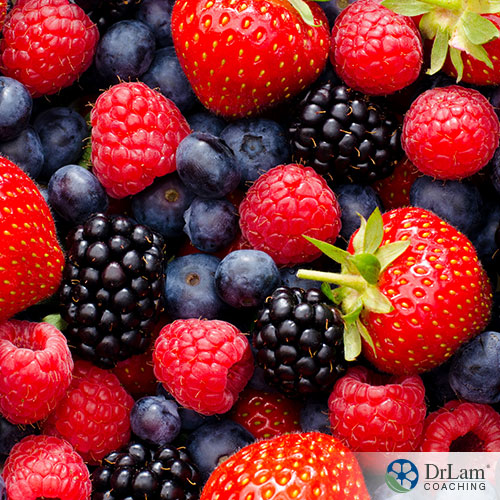 It’s usually recommended to obtain all the antioxidants your body needs through your diet. This can make things a little more difficult, but it’s extremely important. Eating whole foods is more effective and also much safer since some supplements can increase your risk of cancer. At the moment, current medical science doesn’t know enough about the body and its processes to say why antioxidants from foods are absorbed more readily and offer better results. It may just be the combination of nutrients.
It’s usually recommended to obtain all the antioxidants your body needs through your diet. This can make things a little more difficult, but it’s extremely important. Eating whole foods is more effective and also much safer since some supplements can increase your risk of cancer. At the moment, current medical science doesn’t know enough about the body and its processes to say why antioxidants from foods are absorbed more readily and offer better results. It may just be the combination of nutrients.
Antioxidant-rich foods usually contain many other nutrients essential for good health such as flavonoids and lycopene. So, try to get most of your nutrients from the foods you eat and only take antioxidant supplements if your healthcare practitioner advises you to do so.
If you’re suffering from AFS, proceed with caution if you decide to make any changes to your diet or lifestyle. Adding new things to your diet, including antioxidants, can trigger paradoxical reactions or unwanted side effects if you suffer from AFS, which means you could actually do more harm than good. So, it’s best to seek the advice of a trained medical professional first – one who is knowledgeable about AFS and has the right experience to guide you on your path to recovery. This is the only way to make changes that won’t hurt your body by bringing on additional stress or triggering an adrenal crash. Adrenal crashes can be terrifying because your overloaded body shut downs so it can rest and is basically reduced to performing only the most basic functions. If you don’t know what’s happening, suddenly being unable to get out of bed can be extremely frightening.
Increasing the number of antioxidants in your diet is not that hard. You just need to increase the quantity and selection of plant-based foods you eat to ensure you’re getting a wide variety of antioxidants. This is particularly important if you’re suffering from AFS because it is so strongly linked to stress. Stress is a primary cause of imbalances between free radicals and antioxidants in your body and stress can have devastating effects on your body both in the short-term and the long-term. Making the switch to a more antioxidant-rich diet is a good idea in general because it will increase the number of essential nutrients, vitamins, and phytochemicals in your diet, which will help your body and its systems function at their very best.
Dark Chocolate, Berries, Beets, Grapes, Pecans, and many more foods are high in antioxidants.
There are several different types of antioxidants. All of them will improve your overall health and help you live a long life, but certain antioxidants are particularly good for specific health complaints.
